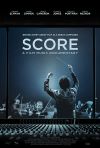 Though he has been a news producer since 2005, Matt Schrader sought to ‘leap out of that world’ to try something different when he endeavored to create the singular project Score – A Film Music Documentary. While Schrader had seen DVD featurettes about feature film composers, he learned that a full-length movie about the subject had never previously been attempted. As Schrader had no connection whatever to the film composer world, he began the process by first reaching out to film licensing experts and film music agents. “To introduce us to people we needed to interview, but also get a better sense of what this industry feels like,” he revealed of his early ventures.
Though he has been a news producer since 2005, Matt Schrader sought to ‘leap out of that world’ to try something different when he endeavored to create the singular project Score – A Film Music Documentary. While Schrader had seen DVD featurettes about feature film composers, he learned that a full-length movie about the subject had never previously been attempted. As Schrader had no connection whatever to the film composer world, he began the process by first reaching out to film licensing experts and film music agents. “To introduce us to people we needed to interview, but also get a better sense of what this industry feels like,” he revealed of his early ventures.
At the outset, Schrader discovered that there are only about 50 composers who have scored films. “A small number of voices who are dominating the box office, week after week,” he stated. “There’s a lot of competition—that’s where the film music agents came in. We started to get in touch with some fantastic people.”
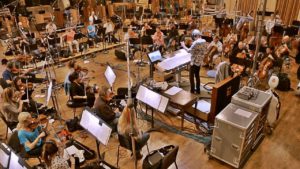
Eventually, Schrader connected with dozens of people throughout the industry and created good will among them. “We started with cold emails and cold calls to composers’ studios,” Schrader described. “Over the course of maybe six or eight months, as we were accumulating 60 interviews, more and more people heard about [his documentary]. Composers heard about it and would love to be interviewed. We built up enough momentum that the project could roll.”
With interview questions tailored to each composer’s career, Schrader and producer Trevor Thompson completed 12 hours of preparation before every one hour of interview executed for the project. “It was my experience as an investigative producer in the news industry that we could custom tailor these questions,” Schrader stated. “In my mind, as a journalist, that’s boring stuff when people go into their auto-responses. Part of our strategy for developing questions was to rehearse and do mock interviews. The strategy was really helpful. After five hours of research on Hans Zimmer, we would role-play interviews. We started to tailor our questions a certain way and avoid any story told before.”
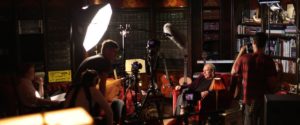
Additionally, Schrader chose to avoid the use of a voice-over narrator for his film. “There’s a trick that a lot of documentaries use—write it with a narrator and go back and interview people, and have them say what the narrator would say,” he said. “We asked all of our questions and remixed the answers that we got. Everything played organically; it didn’t feel like we had a guiding hand all through the documentary. Our organization helped structure that.”
During the editing process, early cuts of the documentary included historically significant figures, but Schrader felt that Score played too long in those versions. “It was a pacing thing that we encountered,” he explained. “A superfan of Elmer Bernstein might be upset that he’s not in this for very long. We started to make those decisions.”
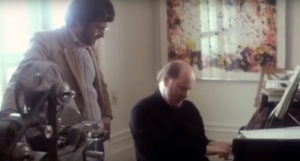
In some cases, Schrader and his team waited over a year to interview the busiest composers, but he understood their need for time and space. “These artists are writing something emotional, not intellectual,” Schrader related of the genesis of cinematic music. “It’s very private when it’s being done. In the middle, they are apprehensive, because they have to come up with some idea, and the clock is ticking. That’s never-wracking for a composer. There are billboards right out of the front door of the studios—there’s the new poster for Mission: Impossible, and it’s someone we were interviewing!”
Regarding the legendary John Williams, Schrader resorted almost entirely to archival material. “We put in a couple of requests, [but] we weren’t able to get a full interview with him,” Schrader conveyed. “What we went with is an escalating tribute to a lot of his music, which is his lasting legacy. All of these composers that we interviewed are truly inspired by what John Williams did, coming into this industry and flipping them on their head with Jaws, Star Wars, and building musical moments in these big spectacle movies—these great themes. That’s a legacy that’s continued to grow. In 500 years, we might remember him more for his music than his films.”
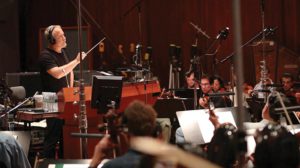
One composer notable for his privacy was the late James Horner, who agreed to conduct an interview for Score before an accidental plane crash ended his life at 61. As Horner was a frequent collaborator of director James Cameron’s, Schrader was able to secure an interview with the filmmaker. “Cameron was devastated when he found out James’ plane had crashed,” Schrader detailed. “We can really see the creative relationship that they had together: talents that enhanced each other’s work. There was a language that was created for Avatar; a chorus, abstract things that he started to come up with.”
For potential viewers, Schrader hopes that Score serves as an introduction to a world that moviegoers already understand, at minimum, subconsciously. “Everyone who grows up in modern culture understands inherently how powerful film music is,” Schrader said. “There’s television, there’s film, and when we watch something, we want to be absorbed in it, drawn in to the experience. The single biggest thing that does that is the music. When you can appreciate it, it enhances the experience all the more.”
For more information on how to view this film, please link to https://www.score-movie.com/watch





